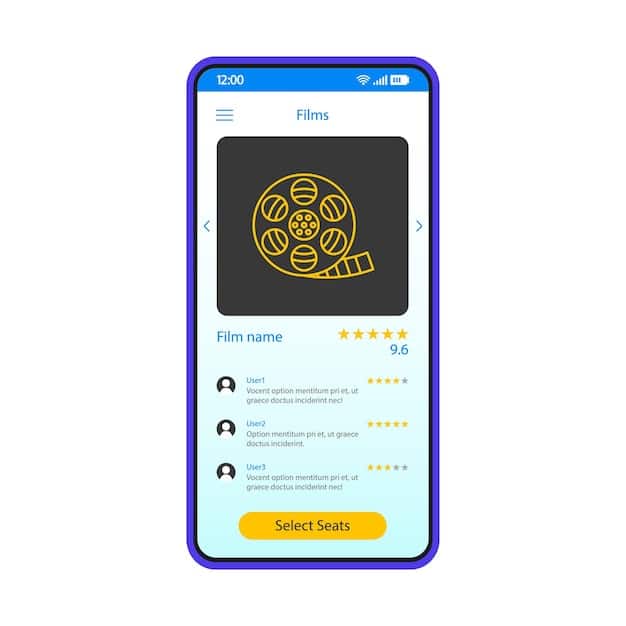The Future of Movie Reviews: AI, Personalization, and Beyond

The Future of Movie Reviews: AI-Powered Analysis and Personalized Recommendations is revolutionizing how we discover and engage with films, using artificial intelligence to provide tailored insights and viewing suggestions.
The way we choose what to watch is changing. Forget generic critic reviews – The Future of Movie Reviews: AI-Powered Analysis and Personalized Recommendations offers a tailored experience, predicting your taste and guiding you to movies you’ll genuinely love.
The Rise of AI in Film Criticism
Artificial intelligence is no longer a futuristic fantasy; it’s a present-day reality transforming numerous sectors, including how we evaluate and choose movies. AI’s analytical capabilities offer a new lens through which to view film criticism.
AI algorithms can process vast datasets of movie attributes, viewer preferences, and critical opinions to generate insightful reviews. This technology promises to enhance the accuracy and personalization of movie recommendations.
Data-Driven Insights
AI excels at identifying patterns and extracting information from large datasets. This is particularly valuable in film criticism, where algorithms can analyze various elements like acting, direction, screenplay, and cinematography.
Objective Analysis
One of the key advantages of AI-driven reviews is their objectivity. AI algorithms are not swayed by personal biases, ensuring that their evaluations are based solely on factual data and predefined criteria.
- Enhances accuracy by reducing subjective opinions.
- Provides data-backed evaluations accessible to everyone.
- Offers diverse analytical perspectives on filmmaking aspects.
In conclusion, AI has the potential to deeply impact film criticism. By delivering objective evaluations and utilizing data-driven analytics, AI transforms traditional methods into comprehensive and personalized movie experiences.
Personalized Recommendations: A New Era of Discovery
One of the most significant aspects of the future of movie reviews is how AI personalizes the viewing experience. No more scrolling endlessly through streaming services; now, technology understands your taste.
Personalized recommendation systems analyze your viewing history, ratings, and preferences to suggest movies that align with your unique profile. This leads to more satisfying and less wasteful viewing sessions.

Algorithmic Tailoring
AI algorithms are designed to cater to individual tastes by taking into account different data points. These points include your viewing habits, ratings, and demographic information to refine your recommendations.
Enhancing User Experience
Personalized recommendations not only save time but also enhance overall user experience. By presenting relevant suggestions, AI makes movie discovery more enjoyable and less overwhelming.
- Improves viewing satisfaction by aligning suggestions with viewer likings.
- Saves time by reducing scrolling and searching efforts.
- Expands viewer horizons by introducing unexpected but relatable films.
In conclusion, personalized suggestions are changing entertainment consumption. These systems provide significant value by simplifying the discovery process and improving viewing experiences, making them vital in film evaluation.
The Role of Human Critics in an AI-Driven World
As AI becomes more prevalent in film reviews, the role of human critics is evolving. It’s not about replacement, but rather a collaboration where human insight complements AI’s analytical power.
Human critics bring creativity, contextual understanding, and emotional intelligence to film evaluation. These qualities are essential for delving into nuances that AI might overlook.
Unique Human Insight
Human critics offer unique insights that algorithms cannot replicate. Their ability to connect films to broader cultural, social, and emotional contexts creates a richer viewing experience.
Collaboration is Key
The future likely involves a collaborative approach where AI handles data processing and initial evaluations, while human critics provide deeper analyses and interpretations.
- Enhances review reliability through algorithmic precision.
- Retains artistic and cultural importance in the evaluation.
- Offers balanced judgements reflecting both data and critique.
In summary, although AI provides data-driven objectivity, it is the unique human ability to see films in a broader context that guarantees a richer, more meaningful evaluation.
Addressing Bias and Ensuring Fairness
While AI promises objectivity, it’s crucial to address potential biases in algorithms. AI systems learn from data, so if the data is skewed, the AI will reflect those biases in its reviews and suggestions.
To ensure fairness, developers must actively work to identify and mitigate biases in training data and algorithms. This includes diversifying datasets and implementing bias detection techniques.

Ethical Considerations
Fairness in AI is an ethical imperative with significant implications for all users. Biased algorithms can perpetuate stereotypes and misrepresent diverse perspectives.
Strategies for Mitigation
Several strategies can be employed to mitigate bias, including data augmentation, algorithm auditing, and the development of interpretable AI models. These models allow developers to understand and correct biased decision-making processes.
- Increases the fairness of movie recommendations offered.
- Promotes inclusivity by representing all perspectives.
- Builds confidence in the integrity of AI review systems.
In conclusion, resolving bias and maximizing fairness are essential for fair and ethical film reviews. By implementing methods that promote diversity and equity, AI review systems can fulfill their promise of unbiased evaluation.
The Impact on Independent Films and Niche Genres
AI has the potential to level the playing field for independent films and niche genres that often struggle to gain visibility. AI-driven recommendation systems can connect these films with viewers who appreciate them.
By identifying and matching niche interests with specific movies, AI can create new audiences and expand the reach of less mainstream productions. This benefits both filmmakers and movie enthusiasts.
Democratizing Discovery
AI democratizes film discovery by removing the reliance on traditional gatekeepers. Independent films can now find their audience based on the merits of their content, rather than marketing budgets.
Expanding Reach
For niche genres, AI opens up new avenues for distribution and exposure. Fans of specific types of movies can discover hidden gems that they might otherwise have missed.
- Elevates smaller budget film viewership.
- Creates niche genre connections through precise suggestions.
- Promotes discovery across unique content pools.
In brief, the democratization and extended reach brought about by AI help independent films and niche genres to prosper, resulting in a more lively and varied cinematic landscape.
Challenges and Future Directions
While AI-powered movie reviews offer many benefits, they also present challenges. Over-reliance on algorithms could lead to homogenization of taste and a decline in critical thinking.
The future of AI in film criticism will likely involve a hybrid approach that combines the strengths of AI with the insight and judgement of human critics. This will require ongoing research and development.
Maintaining Diversity
Ensuring that AI systems promote diversity in movie selection is critical. Algorithms should be designed to expose viewers to a wide range of films, not just those that reinforce existing preferences.
Continuous Improvement
AI algorithms should be continuously refined based on user feedback and critical analysis. The goal is to create systems that are both accurate and nuanced, reflecting the complexity of human taste.
- Requires a balanced strategy to maintain viewing diversity.
- Involves continuously refining algorithms for more exact results.
- Depends on collaborative human and AI enhancements.
In essence, the balance between AI and human critique will characterize the trajectory of movie reviews. This partnership will result in more accessible, relevant, and diversified ways for audiences to interact with cinema.
| Key Point | Brief Description |
|---|---|
| 🤖 AI in Film | AI analyzes data for objective film evaluations. |
| 🎬 Personalized Recommendations | AI tailors movie selections based on viewing history. |
| 🎭 Human Critics | Critics provide emotive, cultural, and contextual depth. |
| ⚖️ Bias Mitigation | Addressing algorithmic biases for equitable viewing suggestions. |
Frequently Asked Questions
▼
AI is revolutionizing movie reviews by providing data-driven analysis and personalized recommendations, offering an objective and tailored viewing experience to users.
▼
Yes, AI can ensure fairer movie recommendations through bias mitigation techniques and diverse data sets, making the reviewing process more inclusive and equitable.
▼
Human critics offer unique insights that algorithms can’t replicate, adding context and emotional depth to reviews for a more comprehensive analysis of films.
▼
AI enhances the visibility of independent films and niche genres by connecting them with specific audiences, ensuring that less mainstream productions gain broader exposure.
▼
The future involves a hybrid approach combining AI precision with human insight, resulting in balanced and diverse film reviews that enrich viewer experiences and promote inclusivity.
Conclusion
In conclusion, the fusion of AI-powered analysis and personalized recommendations signals an exciting shift in how we discover and engage with movies. By addressing biases, promoting diversity, and embracing collaboration between AI and human critics, the future of film reviews promises a more enriching and inclusive cinematic experience for everyone.





